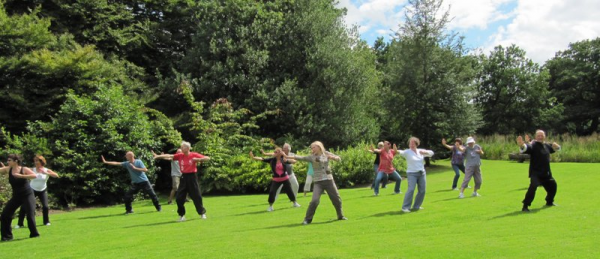(Przegląd literatury naukowej opracowany przez Marcina Małeckiego.)
The number of randomized controlled trials — the gold standard for clinical study — involving mindfulness has jumped from one in the period from 1995‒1997 to 11 from 2004‒2006, to a whopping 216 from 2013‒2015.
Studies have shown benefits against an array of conditions both physical and mental, including irritable bowel syndrome, fibromyalgia, psoriasis, anxiety, depression, and post-traumatic stress disorder.
MBSR means – Mindfulness-Based Stress Reduction program
Opracowanie: Add-Vantage.Warszawa.pl Marcin Małecki
Neuroanatomical effects:
- Lutz, Dunne & Davidson (2008): examined how mindfulness impacts the amygdala, which is a region of the brain that is primarily associated with emotional processes. In the study, it was determined that this area of the brain tended to be less active and have less gray matter density following mindfulness sessions.
- Goldin & Gross (2010): found hippocampus to be more active following mindfulness training. The hippocampus also plays a role in mindfulness. The hippocampus, the region of the brain associated with memory, helps regulate the amygdala.
- Chiesa & Serretti, (2010): found prefrontal cortex to become more active following mindfulness training. Prefrontal cortex is associated with both impulse control and maturity.
- Lazar et al. (2005): found thicker cortical regions related to attention and sensory processing in long-term meditation practitioners, when compared with those who did not meditate. These findings also suggest that simple meditation practice may offset cortical thinning brought about by aging.
- Luders E, Cherbuin N, Kurth F (2015): changes in cortical thickness of meditators. The researchers found that regular meditation practice was able to reduce age-related thinning of the frontal cortex. meditators did not show the expected negative correlation between grey matter volume and age. Meditative practices appear to improve the endocrine balance toward positive arousal (high DHEA, lower cortisol) and decrease oxidative stress. Thus, meditation practices may promote mitotic cell longevity both through decreasing stress hormones and oxidative stress and increasing hormones that may protect the telomere.
Opracowanie: Add-Vantage.Warszawa.pl Marcin Małecki
Physiological effects:
In the 1970s, when transcendental meditation surged in popularity, Herbert Benson, a professor at Harvard Medical School and what was then Beth Israel Hospital, explored what he called “The Relaxation Response,” identifying it as the common, functional attribute of transcendental meditation, yoga, and other forms of meditation, including deep religious prayer. Benson described this response — which recent investigators say is not as common as he originally thought — as the opposite of the body’s adrenalin-charged “fight or flight” response, which was also identified at Harvard, by physiologist Walter Cannon Bradford in 1915.
- Center for Wellness and Achievement in Education in San Francisco, published a study in 2017, that reveals that meditation — alongside other mind-body interventions — is associated with lower levels of the molecule „nuclear factor kappa B,” which influences the regulation of gene expression. The team who conducted that research explains that our bodies typically produce that molecule in response to stress and that it, in turn, activates a series of molecules called „cytokines,” some of which are pro- and some of which are anti-inflammatory. High cytokine activity contributes to many physical and mental health problems, including abnormal inflammation, cancer, and depression.
- Yi-Yuan Tang (2015): a professor of psychological sciences at Texas Tech in Lubbock found that people who smoked were able to cut down on their smoking after taking up mindfulness training. Similarly, research published in the International Journal of Neuropsychopharmacology in 2017 showed that people who usually engaged in heavy drinking consumed 9.3 fewer units of alcohol, which is the equivalent of around 3 pints of beer, in the week that followed brief mindfulness training.
- David Creswell Hector F.Myers et al. (2008): study tested the efficacy of an 8-week Mindfulness-based stress reduction (MBSR) meditation program compared to a 1-day control seminar on CD4+ T lymphocyte counts in stressed HIV infected adults. Participants in the 1-day control seminar showed declines in CD4+ T lymphocyte counts whereas counts among participants in the 8-week MBSR program were unchanged from baseline to post-intervention.
- Davidson RJ1, Kabat-Zinn J, et.al. (2003): Tested 8-week clinical training program in mindfulness meditation, applied in a work environment with healthy employees. Mindfulness resulted in significant increases in left-sided anterior activation, a pattern previously associated with positive affect. We also found significant increases in antibody titers to influenza vaccine among subjects in the meditation, compared with those in the wait-list control group. Finally, the magnitude of increase in left-sided activation predicted the magnitude of antibody titer rise to the vaccine.
- Ditto B1, Eclache M, Goldman N. (2006): Several adults participated in two laboratory sessions in which they practiced meditation or listened to an audiotape of a popular novel. Heart rate, cardiac respiratory sinus arrhythmia (RSA), and blood pressure were measured in both studies. Female participants in Study 2 exhibited a significantly larger decrease in diastolic blood pressure during meditation than the group listening to the novel, whereas men had greater increases in cardiac output during meditation compared to the novel.
- Grossman P1, Tiefenthaler-Gilmer U, Raysz A, Kesper (2007): Study examined effects of an 8-week MBSR (Mindfulness-Based Stress Reduction) intervention among 58 female patients with fibromyalgia. Analyses indicated MBSR to provide significantly greater benefits than the control intervention on most dimensions, including visual analog pain, QoL subscales, coping with pain, anxiety, depression and somatic complaints
- Morone NE1, Greco CM, Weiner DK. (2008): Eight-session mindfulness meditation program for older adults with chronic low back pain (CLBP). Participants were randomized to an 8-week mindfulness-based meditation program or to a wait-list control group. Compared to the control group, the intervention group displayed significant improvement in the Chronic Pain Acceptance Questionnaire Total Score and Activities Engagement subscale.
- Robinson FP1, Mathews HL, Witek-Janusek L. (2003): Study was to examine endocrine function, immunity, and functional health outcomes in individuals infected with the human immunodeficiency virus (HIV). Subjects were specifically recruited (nonrandom) for intervention (MBSR) or comparison group. Natural killer cell activity and number increased significantly in the MBSR group compared to the comparison group.
- Carlson LE1, Speca M, Faris P, Patel KD. (2007): This study investigated the ongoing effects of participation in a mindfulness-based stress reduction (MBSR) program on quality of life (QL), symptoms of stress, mood and endocrine, immune and autonomic parameters in early stage breast and prostate cancer patients. Linear mixed modeling showed significant improvements in overall symptoms of stress which were maintained over the follow-up period. Cortisol levels decreased systematically over the course of the follow-up. Immune patterns over the year supported a continued reduction in Th1 (pro-inflammatory) cytokines. Systolic blood pressure (SBP) decreased from pre- to post-intervention.
- Witek-Janusek L1, Albuquerque K, Chroniak KR et.al. (2008): This investigation used a non-randomized controlled design to evaluate the effect and feasibility of a mindfulness based stress reduction (MBSR) program on immune function, quality of life (QOL), and coping in women recently diagnosed with breast cancer. Early stage breast cancer patients, who did not receive chemotherapy, self-selected into an 8-week MBSR program or into an assessment only, control group. Over time women in the MBSR group re-established their NKCA and cytokine production levels. In contrast, breast cancer patients in the Non-MBSR group exhibited continued reductions in NKCA and IFN-gamma production with increased IL-4, IL-6, and IL-10 production. Moreover, women enrolled in the MBSR program had reduced cortisol levels, improved QOL, and increased coping effectiveness compared to the Non-MBSR group.
Opracowanie: Add-Vantage.Warszawa.pl Marcin Małecki
Brain Functioning:
- Early electroencephalogram (EEG) studies on meditation found that individuals who meditated showed persistent alpha activity with restful reductions in metabolic rate (Anand, Chhina, & Singh, 1961; Bagchi & Wenger, 1957; Wallace, 1970), as well as increases in theta waves, which reflect lower states of arousal associated with sleep (Kasamatsu & Hirai, 1966).
- Gaëlle Desbordes, an instructor in radiology at HMS and a neuroscientist at MGH’s Martinos Center for Biomedical Imaging. In 2012, : usin FMRI, demonstrated that changes in brain activity in subjects who have learned to meditate hold steady even when they’re not meditating.
Opracowanie: Add-Vantage.Warszawa.pl Marcin Małecki
Psychological Effects:
Overall, evidence from correlational research suggests that mindfulness is positively associated with a variety of indicators of psychological health, such as higher levels of positive affect, life satisfaction, vitality, and adaptive emotion regulation, and lower levels of negative affect and psychopathological symptoms. There is also burgeoning evidence from neurobiological and laboratory behavioral research that indicates the potential roles of trait mindfulness and mindfulness meditation practices in reducing reactivity to emotional stimuli and enhancing psychological well-being. Given the correlational nature of these data, experimental studies are needed to clarify the directional links between mindfulness and psychological well-being.
- Carson, J. et al. (2004): from University of North Carolina at Chapel Hill: found that mindfulness can help us nurture healthier relationships. The study demonstrated a correlation between the practice of mindfulness and improved relationships. The couples in the study reported more closeness and more relationship satisfaction amongst other things.
- Beddoe & Murphy, (2004): study on nurses showed that mindfulness practice facilitated empathetic attitudes while decreasing their tendency to take on other people’s negative emotions.
- Lykins and Baer (2009): compared meditators and non-meditators on several indices of psychological well-being. Meditators reported significantly higher levels of mindfulness, self-compassion and overall sense of well-being, and significantly lower levels of psychological symptoms, rumination, thought suppression, fear of emotion, and difficulties with emotion regulation, compared to non-meditators, and changes in these variables were linearly associated with extent of meditation practice.
- Ortner, Kilner and Zelazo (2007): used an emotional interference task in which participants categorized tones presented 1 or 4 seconds following the onset of affective or neutral pictures. Levels of emotional interference were indexed by differences in reaction times to tones for affective pictures versus neutral pictures. A participant’s mindfulness meditation experience was significantly associated with reduced interference both from unpleasant pictures (for 1 and 4 second delays) as well as pleasant pictures (for 4 second delay only), as well as higher levels of self-reported mindfulness and psychological well-being.
- Hodgins & Adair, 2010; Moore & Malinowski, (2009): found that meditation practice is associated with enhanced cognitive flexibility and attentional functioning.
- Davidson et al., (2003): Participation in MBSR has also been associated with brain changes reflective of positive emotional states and adaptive self representation and emotion regulatory processes, such as increases in left frontal activation, which is indicative of dispositional and state positive affect.
- Bostock, Sophie; Crosswell, Alexandra D. et al., (2019): study tested the effects of meditation on the psychological well-being, work stress, and blood pressure of employees working in the United Kingdom. One group of participants were instructed to meditate once a day using a mindfulness app on their smartphones. The meditators also reported a significant decrease in anxiety and stress levels.
- Hoffman et al. (2010): conducted a meta-analysis of 39 studies that explored the use of mindfulness-based stress reduction. Mindfulness meditation increases positive affect and decreases anxiety and negative affect. In one study, participants randomly assigned to an eight-week mindfulness-based stress reduction group were compared with controls on self-reported measures of depression, anxiety and psychopathology, and on neural reactivity —> as measured by fMRI after watching sad films (Farb et al., 2010). The researchers found that the participants who experienced mindfulness-based stress reduction had significantly less anxiety, depression and somatic distress compared with the control group. In addition, the fMRI data indicated that the mindfulness group had less neural reactivity when they were exposed to the films than the control group, and they displayed distinctly different neural responses while watching the films than they did before their mindfulness training.
- Jha et al., (2010): study documented the benefits of mindfulness meditation among a military group who participated in an eight-week mindfulness training, a nonmeditating military group and a group of nonmeditating civilians. Both military groups were in a highly stressful period before deployment. The researchers found that the nonmeditating military group had decreased working memory capacity over time, whereas working memory capacity among nonmeditating civilians was stable across time. Within the meditating military group, however, working memory capacity increased with meditation practice. In addition, meditation practice was directly related to self-reported positive affect and inversely related to self-reported negative affect.
- Study by Mayo Clinic that appears in Climacteric: The Journal of the International Menopause Society: looked at the effects of mindfulness on women who experienced depression, anxiety, and mood swings following menopause. The authors found that this practice helped the participants minimize the effects of these emotional and psychological symptoms.
Opracowanie: Add-Vantage.Warszawa.pl Marcin Małecki
Metaanalyses:
Christopher Liddy and Darren Good on base of 4000 papers found following results:
- Mindfulness cannot only positively impact attention, it can also help improve cognition, emotions, physiology and even behavior.
- Mindfulness can help keep attention stable and help one remain focused on the present. Those who completed mindfulness training were better able to remain vigilant and focused, especially on visual and listening tasks.
- Mindfulness can also give us a boost, helping to provide us with greater empathy and compassion
- Mindfulness can also help reduce the risk of relapse from depression, while also helping with anxiety disorders like PTSD.
- Mindfulness not only helps boost the immune system, but it can also help improve our neural processing in as little as a 10 to 15-minute session.
- Mindfulness can also help with chronic pain. Those who meditated showed a decrease in pain and pain-related limitations. The benefits were comparable with cognitive behavioral therapy.
- In randomized controlled trials, it was shown that mindfulness could help reduce insomnia, according to the Insomnia Severity Index.
Opracowanie: Add-Vantage.Warszawa.pl Marcin Małecki
















